Local and international experts together with the Afrikaanderwijk Cooperative, the Veldacademie and the Department of Social and Policy Sciences of the University of Bath, will assess the need for a Social Harbor: a space for experiments related to new forms of work, based on the use of locally available qualities.
Saturday 25 June, 11.00 am – 15.00 pm
Location: Gemaal op Zuid, Pretorialaan 141, Rotterdam
Want to participate? Please contact the organizers at info@freehouse.nl
Social Harbor workshop
The Hackable City International
Against the backdrop of IABR–2016, the Hackable City will conclude its international comparative research project on new modes of collaborative citymaking – with organizations from São Paulo, Athens, and Shenzhen and Buiksloterham.
Part mini-symposium, part workshop with experts, this exchange aims to consolidate our common understanding of collaborative city making: How can we involve existing stakeholders in city development? Does co-creation lead to a feeling of ownership and more involvement? How can these developments be perpetuated to create resilient cities in the future?
Speakers: Matthijs Bouw (One Architecture), Martijn de Waal (The Mobile City), Andréa Sender (Accupuntura Urbana), Dimitris Charitos & Louliani Theona (University of Athens, Laboratory of New Technologies in Communication), Indira van ‘t Klooster (A10 new European Architecture), Lot Mertens (Gemeente Rotterdam). Marjolijn Wilmink (MVO), Linda Vlassenrood (INTI)
More information and reservation thehackablecity.nl
FRIDAY 24 JUNE
Time: 3-5 p.m.
Location: Fenixloods II, Paul Nijghkade 19, Rotterdam
Language: English
Admission fee: none, provided you can produce a valid exhibition ticket
Water Game: Playing for Urban Common Pool Resources
Abstract and complex issues such as rain and floods are difficult to discuss, let alone offer concrete perspectives. Gaming engages the player, forms unexpected coalitions and offers a playful way to experiment and understand complex systems.
A game on water and circularity is developed as part of The Hackable City research project. The game is a visual brainstorm to examine possible scenarios, solutions and collaborations and the role local stakeholders can play. Which alternative values (ecological, social and cultural values) could be developed? And could this lead to new collaborations and action?
A workshop / game session open to the audience
WEDNESDAY 29 JUNE
Time: 2-5 p.m.
Location: Fenixloods II, Paul Nijghkade 19, Rotterdam
Language: Dutch
Admission fee: none, provided you can produce a valid exhibition ticket
A high-quality metropolitan landscape is becoming a key success factor for knowledge economies worldwide. How can we adapt to this trend in the Netherlands? Are we using our landscape to our benefit in the global battle for talent? And do we invest enough in the development, protection and accessibility of the metropolitan landscape?
The recent publication Blind Spot offers instruments, backgrounds and inspiring international examples. They are the starting point of our workshop in two Dutch pilot regions: the Metropolitan Region of Rotterdam–The Hague and the Metropolitan Region of Amsterdam. The workshop is open to designers, policy makers and other stakeholders, also from other regions.
Blind Spot is an initiative of the Deltametropolis Association, West8, Wageningen UR, Cultural Heritage Agency of the Netherlands, ministry of Economic Affairs and Staatsbosbeheer.
The book Blind Spot is for sale at the IABR–Bookshop during IABR–2016
WEDNESDAY 15 JUNE
Time: 6 - 8 p.m.
Participation: at the invitation of Vereniging Deltametropool
More information about Blind Spot here.
In studies the concept of the Gig Economy has been advanced– making a living with temp jobs. On the street we call it hustling – creating your own opportunities and doing what you have to. Both terms are about one and the same thing: the requirement of other skills than living off a steady job .
What does hustling in the Next Economy mean? How can we build a life on juggling gigs? What impact do new platforms have on our opportunities? Which changes are about to happen and how do they affect our city? Economic Explorations Rotterdam and Studio Wolfpack are diving into it. Please join us and learn with us.
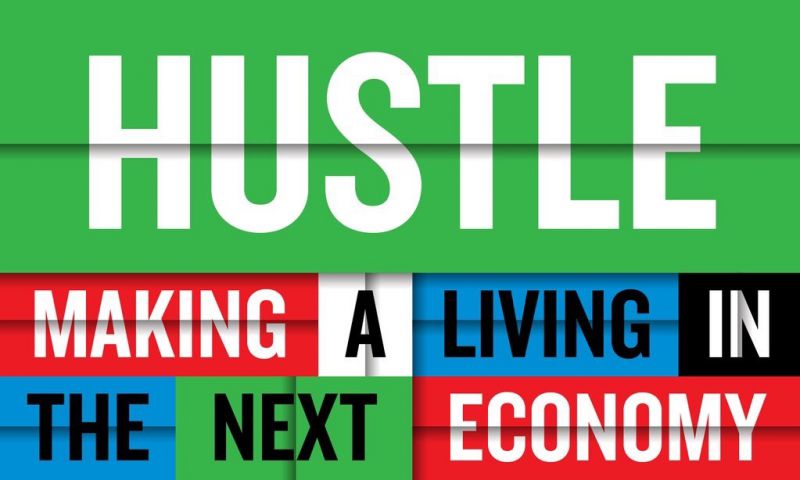
Guests:
Serdar Özturk, photographer and best practice of the gig economy – found his niche: Turkish weddings; hussled his way up and now has over 40k followers on Instagram
Ruud Muffels, professor at Tilburg University and director of the Research Institute for Flexicurity, Labour Market Dynamics and Social Cohesion – how demanding and/or challenging will the next economy be?
Aruna Vermeulen, co-founder of the Hiphophuis and Renee Trijselaar, business coach – about actual hustling and conducting business at street level.
Harmen van Sprangen Share NL – knowledge platform for the sharing economy- about its shared city approach and opportunities for Rotterdam.
Alex Rosenblat Data & Society (NYC) – about her research on the algorithms and the deliberate side effects of Über;
Mattijs Taanman, transition researcher talks about the solidarity bubble that is about to blow up.
Moderator is Bart Krull (Social Enterprise NL, Tegenlicht meet ups and the Skills-series at Pakhuis de Zwijger).
WEDNESDAY 29 JUNE
Time: 5.30 - 7.30 p.m. (doors open 5 p.m.)
Location: Fenixloods II, Paul Nijghkade 19, Rotterdam
Language: Dutch
Admission fee: none, provided you can produce a valid exhibition ticket.
Making a reservation in advance is highly recommended, go here.
The Next Story #7: Petra de Reus
Petra will also look forward. What will the future bring? What will the story of the fourth generation on Katendrecht be like? What is her personal perspective?
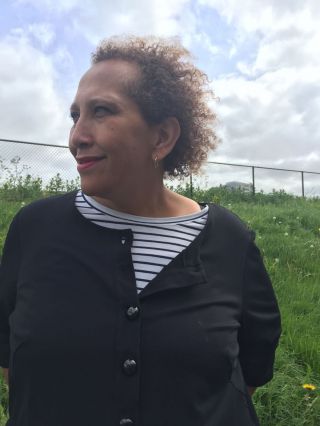
An active local resident, Petra de Reus connects all kinds of people and places. She works at establishing contacts between old and new residents in the context of the program ‘De verhalen van onze straten’ (The stories of our streets). In addition, she organizes an annual reunion for (former) ‘Kaap’ residents. Professionally, she works for one of the welfare services active in Rotterdam South.
Are you as curious as we are about this personal family story and about Petra’s unique perspective on Katendrecht? We cordially invite you to join us at the Verhalenhuis on 5 June.
SUNDAY 5 JUNE
Time: 16:00 – 17.30
Location: Rechthuislaan 1, Rotterdam
Language: Dutch
Entrance: Free
More information: www.belvedererotterdam.nl
A the request of IABR–2016 the Verhalenhuis Belvédère developed The Next Story. In ten afternoon sessions during the Biennale, remarkable stories of inhabitants of Katendrecht will be shared with the audience. What is their Next Story? Based on their past and present situation, what future would they want, and how is their narrative related to Katendrecht? Together, these personal anecdotes will show how active individuals can influence the development of their neighborhood, and even their city.
Urban Circular Economy
What are the consequences for the city and its public space when the circular economy moves from niche to mainstream? How can the public space, as a place to test or showcase products or services, be of greater value for these entrepreneurs? What are the 'no regret' investments in public space and who and what will add to its value?
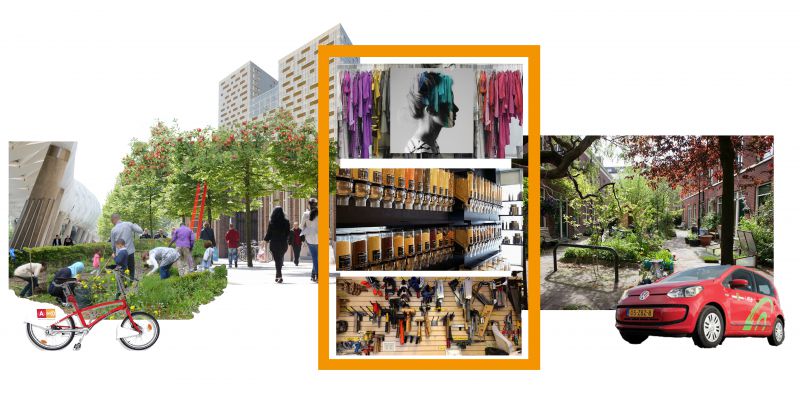
These and other questions will be discussed in this expert meeting. In a second session ideas will be put into practice by testing them on the case study The New Maker Space, by Blue City 010.
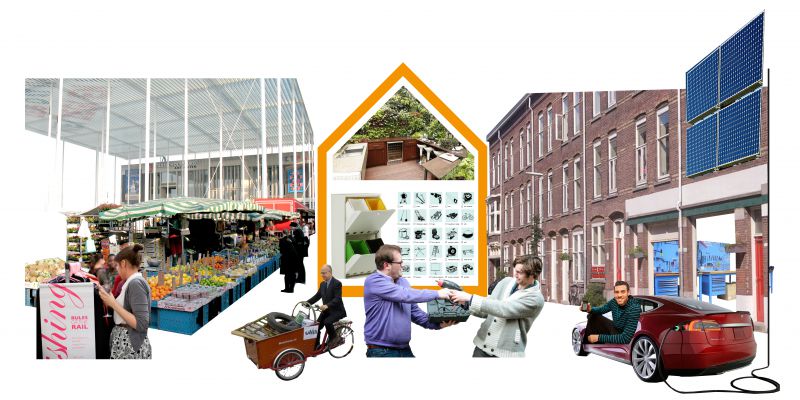
FRIDAY 10 JUNE
Time: 10.20 a.m. - 2 p.m. (registration 10 a.m.)
Location: Fenixloods II, Paul Nijghkade 19, Rotterdam
Language: Dutch
Admission fee: none, provided you can produce a valid exhibition ticket.
Participation is possible by sending an email to mail@daviddooghe.com
The expert meeting follows the project Urban Circular Economy, developed by David Dooghe en Buro Boris for the open call The Urban Metabolism, organized by the Creative Industries Fund NL.
The Next Spreadsheet
What would the new businessmodel for creating multiple wealth look like? And what would that imply for the 'spreadsheet'?
In a closed meeting organized by Nederlandwordtanders, a diverse group of speakers will speculate about The Next Spreadsheet. Presenting their thoughts and ideas are, among others, Herman Hertzberger, Taco van Hoek, Rudy Stroink, Elies Koot, Marthijn Pool, Reimar von Meding, Jaap Jan Verboom and Floris Alkemade.
THURSDAY 9 JUNE
Time: 5 - 7 p.m.
Location: Fenixloods II, Paul Nijghkade 19, Rotterdam
Language: Dutch
Admission fee: none, provided you can produce a valid exhibition ticket.
To register as participant please send an email to info@nederlandwordtanders.nl by June 2 (limited capacity)
More info: www.nederlandwordtanders.nl
The Next Story #10: Janneke Eikelenboom
Janneke: ‘Katendrecht is where the world is and where I can be myself.’ She is very happy with her new home in the middle of the neighborhood. ‘Across the street are the houses of people who have been living in "de Kaap” for a very long time. When the weather is good, they bring out the baby pools and the barbecues: this neighborhood is alive.’ Janneke is a volunteer at the Verhalenhuis. Her motto: ‘You’ve got to give to get.’
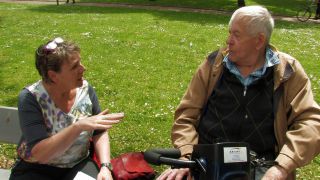
still from film by Rick Messemaker
In everyday encounters on the streets of her neighborhood, she deliberately engages with many different people. She is curious and finds that, generally speaking, people like it if you take time to talk to them. In the last Next Story, Janneke will tell us all about these and similar subjects. She will also present a film by Rick Messemaker, introducing one of the older residents and a young entrepreneur, two of the people she met in the streets of Katendrecht.
Curious? Come join us at the Verhalenhuis on 26 June.
SUNDAY 26 JUNE
Time: 16:00 – 17.30
Location: Rechthuislaan 1, Rotterdam
Language: Dutch
Free admission
More information: www.belvedererotterdam.nl
A the request of IABR–2016 the Verhalenhuis Belvédère developed The Next Story. In ten afternoon sessions during the Biennale, remarkable stories of inhabitants of Katendrecht will be shared with the audience. What is their Next Story? Based on their past and present situation, what future would they want, and how is their narrative related to Katendrecht? Together, these personal anecdotes will show how active individuals can influence the development of their neighborhood, and even their city.
The ecological implications of large-scale wind energy development on the North Sea
During this mini-symposium, the IABR project 2050 – An Energetic Odyssey, an exploration of the possibilities of large-scale wind energy production on the North Sea and presented in the exhibition The Next Economy, will be discussed with an international group of ecologists and marine biologists. The symposium will address the issue of the ecological implications of the development of 25,000 offshore wind turbines in the North Sea. Can existing routes of migratory birds be taken into account? What species benefit from the new habitats offered by wind farms? And what is the impact of the construction of this many wind turbines on marine mammals such as the porpoise?
The results of this symposium will help give direction to the research efforts that will be made in the coming years to ensure that the roll-out of offshore wind will not happen at the expense of the marine ecology.
By Invitation only
Beyond Gentrification
Besloten workshop voor relaties van Heijmans georganiseerd door de IABR o.l.v. Mark Brearley over andere manieren van projectsontwikkeling met specifiek in het vizier de toekomst van Katendrecht.
Tomorrow's Habitat
On June the 9th, the program team of the Dutch National Vision on the Environment convenes a plenary session for 250 guests. During the session the progress of the Vision will be discussed, together with Hans Tijl (director Spatial Development, Ministry of Infrastructure and the Environment), Maarten Hajer, several representatives of the Dutch provinces and the audience.
The agenda of IABR–2016 will inspire the debate that will focus on Next Energy (energy transition), Next Living (healthy city), Next Farming (agricultural transition) and the Next Economy.
Emphasis will be put on identifying the real dilemma’s behind the themes: where do the difficulties lie? And in which domain (technical, political, social) are actions needed?
The results of the session will provide input for the further development of the National Vision on the Environment.
THURSDAY 9 JUNE
Tijd: 9.30 am - 1 pm
Location: Fenixloods II, Paul Nijghkade 19, Rotterdam
Language: Dutch
Admission: by invitation
Launch of the Center for Public Imagination
In what is called the ‘smart’ or ‘sentient city’, urban politics is increasingly rooted in a network of sensors that monitor processes ranging from traffic flow to public aggression, and from waste disposal to air pollution. In smart city imaginaries, streets are monitored by sensors, some of them hovering over the city in drones; buildings will be connected through the Internet of Things, and urban services will be permanently calibrated on the basis of real-time monitoring data. The smart city is at once a business model, a policy toolbox and an infrastructure for citizen participation. It is part (science) fiction, part political reality, part corporate sales talk, and part techno-utopian desire. City governments, technology corporations and design companies converge in creating the actually existing smart city. But because the smartness of the city is projected into the future, it is key to zoom in on the imagination of smartness, the changing vocabularies of politics in the smart city, and the desires that animate it. Accordingly, this event seeks to highlight the smart imaginaries operative in urban politics.
This event, which will be tied to the launch of the Dutch inter-university Center for Public Imagination, explores smart imaginaries by focusing on questions such as:
• What happens to urban politics when government becomes an operating system, urban progress becomes optimization, and policy becomes a series of pilots, experiments, tests and demos?
• Which sites become political in the sense that they instantiate ways of caring for public issues, and how can those sites be interfaced with?
• What does it mean that to be political is to interface?
• What desires and which imaginaries animate urban smartness, efficiency and optimization?
• Which alternative imaginations are active, and how do they envisage urban politics?
In the morning, lectures by several speakers offer possible answers to such questions. They will be input for discussion and inspiring explorations in working groups in the afternoon. The afternoon sessions are open and structured loosely by the issues and concerns raised in the morning. They allow for a lively investigative atmosphere. Their results will be presented at the end of the afternoon in a final plenary discussion.
Speakers include Willem Schinkel, Professor of Social Theory, Erasmus University Rotterdam; Noortje Marres, Centre for Interdisciplinairy Methodologies, University of Warwick; and Huub Dijstelbloem, Professor of Philosophy of Science and Politics, University of Amsterdam; Karen Maex, Rector University of Amsterdam and Maarten Hajer, Chief Curator IABR–2016.
The discussion will be led by Tracy Metz, journalist, author and director of the John Adams Institute.
FRIDAY 17 JUNE
Time: 10.00 - 5 p.m. (registration 9.30 a.m.)
Location: Fenixloods II, Paul Nijghkade 19, Rotterdam
Language: English
Admission fee: none, provided you can produce a valid exhibition ticket.
The Next Story #9 Lisette Magis
On Sunday 19 June, social entrepreneur and driving force behind De Bakkerswerkplaats, Lisette Magis, is our guest at the Verhalenhuis. De Bakkerswerkplaats is the perfect place to learn the craft of baking bread. It is a workshop that is open to local residents, professionals, young people, and people that have trouble finding a foothold in the labor market. Learning a craft improves their job prospects.
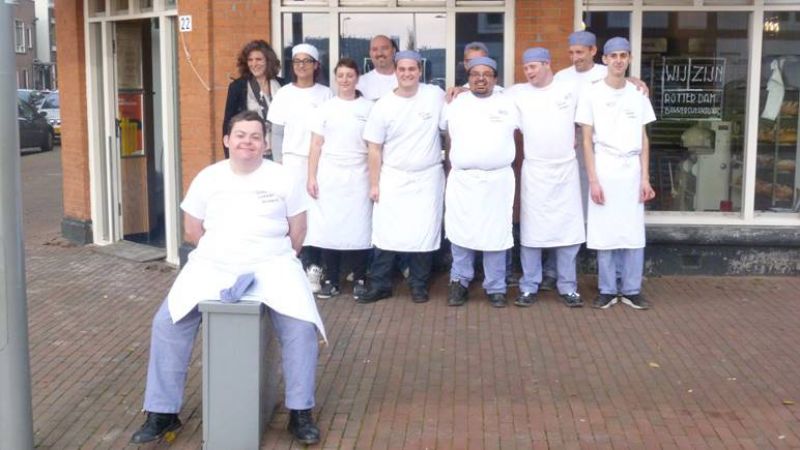
De Bakkerswerkplaats uses locally grown and milled flours, organic yeast, and locally fermented sourdough cultures. They bake to order and therefore no energy or resources go to waste. Curious about this fascinating practical example of The Next Economy? We cordially invite you to join us for an afternoon at the Verhalenhuis.
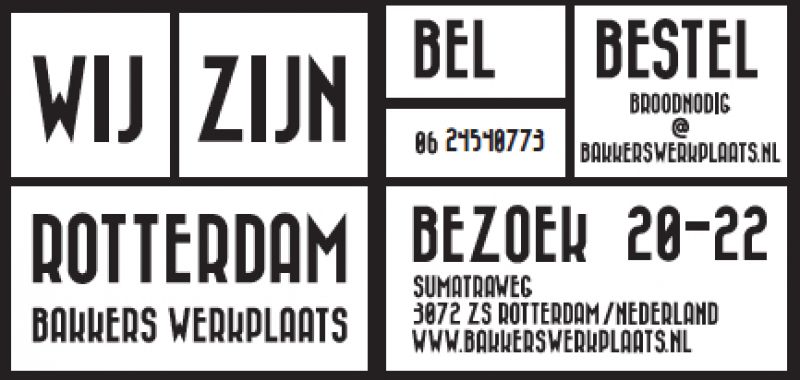
SUNDAY 19 JUNE
Time: 16:00 – 17.30
Location: Rechthuislaan 1, Rotterdam
Speaker: Lisette Magis
Language: Dutch
Admission is free, reservations can be made through reserveren@verhalenhuisbelvedere.nl
More information: www.belvedererotterdam.nl
A the request of IABR–2016 the Verhalenhuis Belvédère developed The Next Story. In ten afternoon sessions during the Biennale, remarkable stories of inhabitants of Katendrecht will be shared with the audience. What is their Next Story? Based on their past and present situation, what future would they want, and how is their narrative related to Katendrecht? Together, these personal anecdotes will show how active individuals can influence the development of their neighborhood, and even their city.
De Voorkamer is a social design method used to put asylum seekers in contact with local residents. It examines and visualizes the absorption capacity of the city. A presentation on the subject in Gemaal op Zuid is continuously updated on the basis of the workshops.
SATURDAY 14 MAY
Time: 12.30 - 2.30 p.m. lunch included
Location: Gemaal op Zuid Pretorialaan 141
Admission: Free, registration through info@freehouse.nl
More information: www.freehouse.nl
De Voorkamer is a social design method used to put asylum seekers in contact with local residents. It examines and visualizes the absorption capacity of the city. A presentation on the subject in Gemaal op Zuid is continuously updated on the basis of the workshops.
SATURDAY 4 JUNE
Time: 12.30 - 2.30 p.m.
Location: Gemaal op Zuid Pretorialaan 141
Admission: Free
More information: www.freehouse.nl
The Next Story #6: Jeroen de Loor, Tineke van der Burg and Lamya Dahly
ROS: Rotterdam Support Center for the Undocumented
Invisible people live on the fringes of the city. Sometimes you see them, but then they quickly disappear from view. Are you sure you even saw them? Approximately 15,000 undocumented people live in Rotterdam. They are there, but officially they do not exist. The key guests of Next Story #6 are actively involved in the ROS Foundation, the Rotterdam support center for undocumented people. Katendrecht has long been home to the ROS foundation, which supports people without residence permits as well as volunteers and organizations that work with undocumented people in all kinds of ways. Once inside, you have literally crossed the threshold to another world. During this afternoon, you get an inside view.
Architect Jeroen lives in Katendrecht. He teaches Dutch to refugees at the ROS every week. In addition, he and some other people that are active at the ROS have initiated KIFF, the Katendrecht International Film Festival. Tineke works on the development of the Food Garden in the Merwedehaven area and works for the ROS one day a week. She is responsible for fundraising and attends the open house every Wednesday afternoon. This year, Jeroen and Tineke organized the third edition of the KIFF with the Verhalenhuis. What is special about this film festival is that refugees and Katendrecht residents program the films together.
This afternoon, we’ll talk about the future of the humane city. We’ll start with the stories of today – the stories of Jeroen and Tineke. Who are they? What are their reasons for committing to the public good? And how do Jeroen and Tineke see the future of the city, based on their experiences with the people they meet and the activities they undertake?
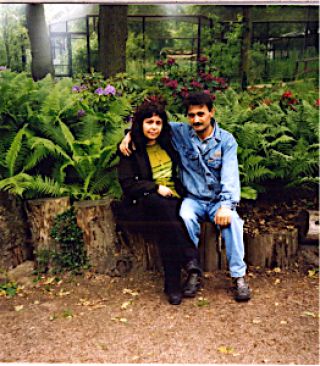
Curious about the stories of these residents of Rotterdam? We cordially invite you to join us for a special afternoon.
SATURDAY 4 JUNE
Time: 16:00 – 17.30
Location: Rechthuislaan 1, Rotterdam
Language: Dutch
Entrance: Free
More information: www.belvedererotterdam.nl
A the request of IABR–2016 the Verhalenhuis Belvédère developed The Next Story. In ten afternoon sessions during the Biennale, remarkable stories of inhabitants of Katendrecht will be shared with the audience. What is their Next Story? Based on their past and present situation, what future would they want, and how is their narrative related to Katendrecht? Together, these personal anecdotes will show how active individuals can influence the development of their neighborhood, and even their city.
At the kick-off meeting on April 28, The Hague presented transition challenges as well as a special magazine on the Central Innovation District (CID). This meeting was the start of a series of discussions and gaming sessions with a focus on these challenges, while playing the CID board game at The Hague IABR-table.The results of all these sessions have been collected and stayed on the table to be presented on June 7. In this way, the table becomes a living lab to help shape the future of the city and its position as International City of Peace & Justice in connection with the knowledge-based Next Economy.
The transition challenges are the result of global trends and call for unconventional responses for The Hague to keep the city socially and economically vital. In the economic field, the city is in a transition from national services city to international city of knowledge. The Hague uses the IABR to share views on this transition with many stakeholders. The CID plays a key role in the future of The Hague and at higher scale for the metropolitan region (MRDH) and Randstad area. The CID is a strategically located area around the three central station locations that make the connection between the innercity functions (around Central Station), the business district at Beatrixkwartier (Laan van NOI) and the area of education and start-ups at Binckhorst/Laakhavens (Hollands Spoor). In the vicinity of these stations, already the most important educational institutes of The Hague are situated (such as Leiden University/Campus The Hague, The Hague University of Applied Sciences and The Hague Security Delta) and new institutes are planned. There are opportunities for further concentration of innovative and knowledge-intensive environments connected with mixed-use and high-density urban development. The CID magazine is an invitation to partners and parties to think about goals, challenges, dilemmas, opportunities and solutions.
In a broader perspective, the ambition and challenge for The Hague is, connected with the CID and other developments, to boost the position as International City of Peace & Justice and to connect it with the knowledge-based Next Economy. This will further strengthen the city's position as a global center of expertise in the field of peace, justice, safety and security and good governance. By connecting the theme of justice and peace to issues of spatial planning, knowledge is developed and shared about more sustainable and socially equitable forms of spatial planning, for which the term 'Just Urbanism' is introduced.
TUESDAY 7 JUNE
time: 10 am – 1 pm
Location: IABR–2016, Fenixloods II, Paul Nijghkade 19, Rotterdam
Language: English
Registration by email: babette.heppener@denhaag.nl
On the 8th of June, an expert meeting will take place at IABR–2016 as part of En Passant: KIOSK, a research conducted by kioskologists Jacques Beljaars and Thomas Rouw in collaboration with Urban Sociology students from the University of Amsterdam. In this semi-closed meeting a limited number of experts in architecture, urban development, urban economy and urban sociology will be brought together to discuss and deliberate on ‘The Next Economy’ from the viewpoint of the kiosk.
As a small freestanding vending booth, the kiosk provides a meaningful contribution to the quality of public space. The kiosk invites passers-by to slow down, to stay and eat in the public domain, to meet with acquaintances and with strangers. It means trade and animation. The entrepreneurs as Public Characters who know their customers well, act as ‘eyes on the street’ and thus improve safety and the quality of life in the city. The kiosk provides human proportions to the build environment and the informal, sometimes even ludic architectonic experiments with anarchistic aesthetics, are a visual relieve amidst the fashionable sleek and slick designed street facades. At last, as a mini-enterprise, the kiosk is an often easy accessible and stable employer, which contributes in a sustainable way to the urban economy.
Within social trends such as the changing composition of the urban population, ‘festivalisation' of public space, civic initiatives and a growing independent and creative entrepreneurship, how can the kiosk act as representative of the Next Economy?
Those interested in participation as an expert can send a short cv and a small letter of motivation no later than may 25th to info@enpassantkiosk.nl. Due to the small number of experts required not all of those interested can actually participate. A selection will be made based on a balanced representation of the various disciplines.
The expert meeting is part of a three-part program of En Passant: KIOSK at the IABR–2016. A public lecture and a guided bike tour through Rotterdam complete the kiosk-program at the IABR 2016.
WEDNESDAY 8 JUNE 2016
Time: 1 - 3.30 p.m.
Location: Fenixloods II, Paul Nijghkade 19, Rotterdam
Language: Dutch
Moderators: Jacques Beljaars & Thomas Rouw
Participation: Open to selected participants of the expert meeting
For more information on the expert meeting, please visit enpassantkiosk.nl
On June 24 a lecture on kiosks will be held at the IABR, as part of the research program En Passant: KIOSK, conducted by kioskologists Jacques Beljaars and Thomas Rouw in collaboration with Urban Sociology students from the University of Amsterdam. The kiosk will be viewed from a historical and contemporary perspective and a reflection held on its future value and significance as co-designer of the ‘Next Economy’. After the lecture a Q&A follows with the audience.
As a small freestanding vending booth, the kiosk provides a meaningful contribution to the quality of public space. The kiosk invites passers-by to slow down, to stay and eat in the public domain, to meet with acquaintances and with strangers. It means trade and animation. The entrepreneurs as Public Characters who know their customers well, act as ‘eyes on the street’ and thus improve safety and the quality of life in the city. The kiosk provides human proportions to the build environment and the informal, sometimes even ludic architectonic experiments with anarchistic aesthetics, are a visual relieve amidst the fashionable sleek and slick designed street facades. At last, as a mini-enterprise, the kiosk is an often easy accessible and stable employer, which contributes in a sustainable way to the urban economy.
Within social trends such as the changing composition of the urban population, ‘festivalisation' of public space, civic initiatives and a growing independent and creative entrepreneurship, how can the kiosk act as representative of the Next Economy?
Program follows soon.
The lecture is part of a three-part program of En Passant: KIOSK at the IABR. An expert meeting and a bike tour through Rotterdam complete the kiosk-program at the IABR 2016.
Friday 24 JUNE 2016
Time: 5.30 pm-7.30 pm
Location: Fenixloods II, Paul Nijghkade 19, Rotterdam
Language: Dutch
Admission fee: none, provided you can produce a valid exhibition ticket.
For more information on the lecture, please visit enpassantkiosk.nl